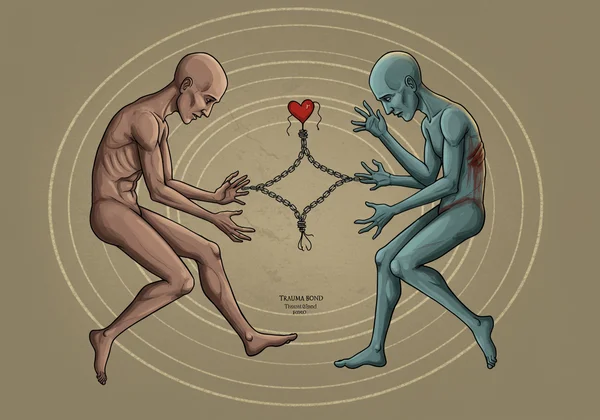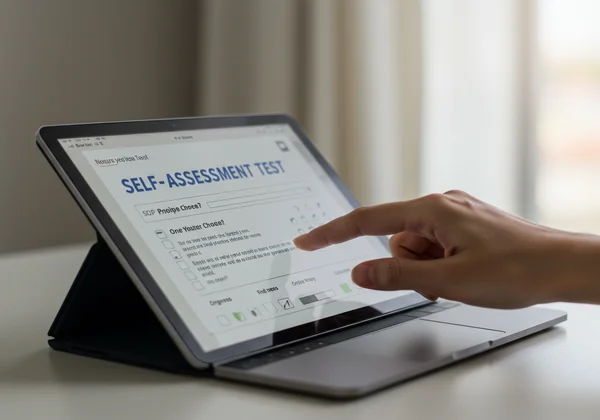नार्सिसिस्टिक दुर्व्यवहार और cPTSD आघात: निःशुल्क PTSD परीक्षण
क्या आपको कभी ऐसा महसूस हुआ है कि आप बहुत सतर्क या डरे हुए हैं, भले ही आपको चोट पहुँचाने वाला व्यक्ति चला गया हो? नार्सिसिस्टिक दुर्व्यवहार का अनुभव गहरे, अदृश्य घाव छोड़ सकता है, जिससे चिंता, आत्म-संदेह और भावनात्मक उथल-पुथल की एक भ्रमित करने वाली आंतरिक दुनिया बन जाती है। आप अपनी वास्तविकता पर सवाल उठा सकते हैं, यह सोचकर कि क्या आपको महसूस होने वाला दर्द वैध है। यह लेख नार्सिसिस्टिक दुर्व्यवहार और कॉम्प्लेक्स PTSD (cPTSD) के बीच गहरे संबंध को उजागर करेगा, जिससे आपको भावनात्मक फ्लैशबैक और आत्म-बोध का टूटना जैसे लक्षणों पर स्पष्टता खोजने में मदद मिलेगी। यदि आप सोच रहे हैं, क्या मुझे PTSD है? यह सवाल आपके मन में उठ रहा है, तो आप अकेले नहीं हैं। जानें कि हमारा निःशुल्क, गोपनीय ऑनलाइन परीक्षण समझ और उपचार की दिशा में आपका पहला साहसिक कदम कैसे हो सकता है। आप अभी परीक्षण शुरू कर सकते हैं।

भावनात्मक शोषण के आघात को समझना: नार्सिसिस्टिक दुर्व्यवहार क्या है?
भावनात्मक शोषण का आघात अक्सर कपटपूर्ण होता है। शारीरिक घावों के विपरीत, इसके निशान आपके मन पर पड़ते हैं, जिससे आप खुद को और दुनिया को कैसे देखते हैं, यह प्रभावित होता है। नार्सिसिस्टिक दुर्व्यवहार इस आघात का एक विशेष रूप से हानिकारक रूप है, जिसकी विशेषता है लगातार हेरफेर, नियंत्रण और दुर्व्यवहार करने वाले में सहानुभूति की पूर्ण कमी। यह आपकी पहचान को धीरे-धीरे खत्म करने का एक तरीका है, जिसे आपको आश्रित और आज्ञाकारी बनाने के लिए डिज़ाइन किया गया है।
शब्दों से अधिक: नार्सिसिस्टिक और गुप्त दुर्व्यवहार को परिभाषित करना
जब लोग नार्सिसिज्म के बारे में सोचते हैं, तो वे अक्सर किसी लाउड और घमंडी व्यक्ति की कल्पना करते हैं। हालांकि, कई उत्तरजीवी गुप्त दुर्व्यवहार से निपटते हैं, जो कहीं अधिक सूक्ष्म होता है। यह लगातार गैसलाइटिंग है जो आपको अपनी याददाश्त पर सवाल उठाने पर मजबूर करती है, निष्क्रिय-आक्रामक टिप्पणियाँ जो आपके आत्मविश्वास को कम करती हैं, और "साइलेंट ट्रीटमेंट" जिसका उपयोग आपको दंडित करने के लिए किया जाता है। यह छिपा हुआ दुर्व्यवहार उतना ही हानिकारक है, जिससे भ्रम और अति-सतर्कता की निरंतर स्थिति बनती है। लक्ष्य हमेशा एक ही होता है: आप पर शक्ति और नियंत्रण बनाए रखना।
हेरफेर का चक्र: आघात के बंधन कैसे बनते हैं
एक अपमानजनक रिश्ते को छोड़ना इतना मुश्किल क्यों है? इसका उत्तर अक्सर आघात के बंधनों में निहित होता है। यह एक तीव्र भावनात्मक लगाव है जो दुर्व्यवहार के एक आवर्ती चक्र से विकसित होता है जिसके बाद इनाम या दयालुता का कभी-कभी मिलने वाला प्रोत्साहन होता है। दुर्व्यवहार करने वाला अराजकता पैदा कर सकता है और फिर आपको उससे "बचा" सकता है, या तीव्र क्रूरता की अवधि के बाद आप पर स्नेह बरसा सकता है। यह चक्र मनोवैज्ञानिक रूप से नशे की लत है और एक शक्तिशाली, भ्रमित करने वाला बंधन बनाता है जो प्यार जैसा लग सकता है लेकिन डर और निर्भरता में निहित है।

संकेतों को पहचानना: क्या आपको नार्सिसिस्टिक दुर्व्यवहार से cPTSD है?
जबकि पारंपरिक PTSD अक्सर एक ही, भयानक घटना से जुड़ा होता है, कॉम्प्लेक्स PTSD (cPTSD) आमतौर पर लंबे समय तक, बार-बार होने वाले आघात से विकसित होता है जहाँ पीड़ित के पास भागने का कोई अवसर नहीं होता—नार्सिसिस्टिक दुर्व्यवहार द्वारा बनाया गया सटीक वातावरण। नार्सिसिस्टिक दुर्व्यवहार के संकेत और cPTSD काफी हद तक ओवरलैप होते हैं, जो आपके पूरे व्यक्तित्व को प्रभावित करते हैं। इन लक्षणों को समझना आपके अनुभव को मान्य करने का एक महत्वपूर्ण हिस्सा है।
कॉम्प्लेक्स PTSD (cPTSD) के मुख्य लक्षण सामान्य आघात से परे
cPTSD के मुख्य लक्षण क्लासिक PTSD में देखे जाने वाले फ्लैशबैक और परिहार से परे जाते हैं। वे आपके व्यक्तित्व और रिश्तों में गहराई से निहित होते हैं। इनमें आत्म-मूल्य की पुरानी क्षतिग्रस्त भावना, खालीपन या निराशा की लगातार भावना, और यह विश्वास शामिल हो सकता है कि आप किसी तरह मौलिक रूप से त्रुटिपूर्ण हैं। आप अपने दुर्व्यवहार करने वाले की विकृत धारणा से भी जूझ सकते हैं, कभी-कभी उनके लिए सहानुभूति महसूस कर सकते हैं या उनके दोष को खुद पर ले सकते हैं।
भावनात्मक फ्लैशबैक और डिसरेगुलेशन: मुख्य cPTSD अनुभव
क्या आपको कभी अचानक, भारी भावनात्मक प्रतिक्रिया हुई है जो वर्तमान स्थिति के पूरी तरह से अनुपातहीन लगती है? आपको भावनात्मक फ्लैशबैक हो सकता है। दृश्य फ्लैशबैक के विपरीत, ये आपको मूल आघात की भावनाओं—भय, शर्म, या असहायता—में वापस ले जाते हैं, बिना किसी स्पष्ट छवि के। यह अक्सर भावनात्मक डिसरेगुलेशन से जुड़ा होता है, जहाँ आपको अपनी भावनाओं को प्रबंधित करना अविश्वसनीय रूप से कठिन लगता है, थोड़े से नियंत्रण के साथ तीव्र क्रोध से गहरे दुख तक झूलते रहते हैं।

आत्म-मूल्य और संबंध पैटर्न पर प्रभाव
नार्सिसिस्टिक दुर्व्यवहार के सबसे विनाशकारी प्रभावों में से एक आपके आत्म-मूल्य पर इसका प्रभाव है। व्यवस्थित रूप से अवमूल्यन किए जाने के बाद, आप गहरे बैठे बेकारपन की भावनाओं से जूझ सकते हैं। यह आपके संबंध पैटर्न को गहराई से प्रभावित कर सकता है। आप खुद को समान रूप से जहरीले गतिशीलता की ओर आकर्षित पा सकते हैं, या आप फिर से चोट लगने के गहरे बैठे डर के कारण अंतरंगता से पूरी तरह कतरा सकते हैं। दूसरों पर, और यहां तक कि खुद पर भी भरोसा करना असंभव लग सकता है।
आपका cPTSD नार्सिसिस्टिक दुर्व्यवहार परीक्षण: स्पष्टता की तलाश
यदि ये अनुभव आपसे मेल खाते हैं, तो भ्रम भारी पड़ सकता है। एक cPTSD नार्सिसिस्टिक दुर्व्यवहार परीक्षण आपके विचारों और भावनाओं को व्यवस्थित करने के लिए एक अमूल्य उपकरण हो सकता है। यह आपके लक्षणों को देखने और यह देखने का एक संरचित तरीका प्रदान करता है कि वे आघात के स्थापित पैटर्न के साथ कैसे संरेखित होते हैं। यह प्रक्रिया खुद को लेबल करने के बारे में नहीं है। यह आगे बढ़ने के लिए आवश्यक स्पष्टता प्राप्त करने के बारे में है।
एक स्व-मूल्यांकन एक शक्तिशाली पहला कदम क्यों है
स्व-मूल्यांकन लेना सशक्तिकरण का एक कार्य है। कई उत्तरजीवियों के लिए, दुर्व्यवहार में आपकी स्वायत्तता और नियंत्रण का नुकसान शामिल था। अपने लक्षणों को निजी और गोपनीय रूप से तलाशने का चुनाव अपनी कहानी को वापस पाने का एक तरीका है। यह आपको बिना दबाव या निर्णय के एक सुरक्षित स्थान पर अपनी भावनाओं को समझने की अनुमति देता है। यह प्रारंभिक कदम उत्प्रेरक हो सकता है जो आपको यह समझने में मदद करता है कि आप "पागल" या "बहुत संवेदनशील" नहीं हैं—आप वास्तविक आघात का जवाब दे रहे हैं।
हमारा ऑनलाइन परीक्षण प्रारंभिक अंतर्दृष्टि कैसे प्रदान कर सकता है
हमारा ऑनलाइन PTSD परीक्षण व्यापक रूप से मान्यता प्राप्त PCL-5 स्क्रीनिंग मानदंडों के आधार पर आपको तत्काल, प्रारंभिक अंतर्दृष्टि प्रदान करने के लिए डिज़ाइन किया गया है। यह आपको अपने अनुभवों और cPTSD के संभावित लक्षणों के बीच बिंदुओं को जोड़ने में मदद करता है। हालांकि यह एक पेशेवर निदान का विकल्प नहीं है, यह एक महत्वपूर्ण शुरुआती बिंदु है। निःशुल्क PTSD परीक्षण लेने से आपको अपनी यात्रा को समझने और आगे समर्थन प्राप्त करने के लिए भाषा और आत्मविश्वास मिल सकता है।

आपके cPTSD स्व-परीक्षण के बाद अगले कदम उठाना
आपके परिणाम प्राप्त होने से भावनाओं का मिश्रण हो सकता है—राहत, सत्यापन, और शायद आगे क्या होगा, इसके बारे में कुछ चिंता। याद रखें, यह आपकी उपचार यात्रा की केवल शुरुआत है। आपको जो ज्ञान प्राप्त होता है वह एक उपकरण है, और अब आप तय कर सकते हैं कि इसका उपयोग कैसे करना है। बहुत से लोग सोचते हैं कि PTSD परीक्षण के बाद क्या करना चाहिए?, और आगे का रास्ता कोमल, जानबूझकर उठाए गए कदमों के बारे में है।
आपके परिणामों की व्याख्या: वे आपके लिए क्या मायने रखते हैं
आपके परिणाम आपके वर्तमान लक्षणों का एक संक्षिप्त विवरण प्रस्तुत करते हैं। वे आपको संघर्ष के विशिष्ट क्षेत्रों, जैसे भावनात्मक डिसरेगुलेशन या रिश्तों से जुड़ी कठिनाइयों की पहचान करने में मदद कर सकते हैं। इस जानकारी को अंतिम निर्णय के रूप में नहीं, बल्कि एक मार्गदर्शक के रूप में उपयोग करें। यह पुष्टि करता है कि आपका दर्द वास्तविक है और आपको इसे समझने के लिए एक ढाँचा प्रदान करता है। यह सत्यापन अक्सर प्रक्रिया का सबसे शक्तिशाली हिस्सा होता है, जो दुर्व्यवहार के कारण उत्पन्न आत्म-संदेह के चक्र को तोड़ता है।
आघात की रिकवरी और उपचार के लिए पेशेवर सहायता प्राप्त करना
वास्तविक आघात की रिकवरी और उपचार एक योग्य मानसिक स्वास्थ्य पेशेवर की मदद से सबसे अच्छा होता है, खासकर वह जो आघात और नार्सिसिस्टिक दुर्व्यवहार में माहिर हो। एक चिकित्सक आपके अनुभवों को संसाधित करने, स्वस्थ मुकाबला तंत्र विकसित करने और आत्म-बोध को फिर से स्थापित करने के लिए एक सुरक्षित स्थान प्रदान कर सकता है। आपके परीक्षण के परिणाम इस बातचीत के लिए एक मूल्यवान शुरुआती बिंदु हो सकते हैं, जिससे आपको अपनी संघर्षों को स्पष्ट रूप से व्यक्त करने में मदद मिलती है। गोपनीय परीक्षण को अपना पहला कदम मानें।
सत्यापन और आगे का रास्ता ढूँढना: उपचार की आपकी यात्रा
नार्सिसिस्टिक दुर्व्यवहार के अंधेरे से बाहर निकलने का रास्ता प्रकाश की एक किरण से शुरू होता है: समझ। यह पहचानना कि आपके दर्द का एक नाम है—कॉम्प्लेक्स PTSD—और आपकी प्रतिक्रियाएँ वैध हैं, आत्म-करुणा का एक क्रांतिकारी कार्य है। आपने कुछ अविश्वसनीय रूप से कठिन चीजों से बचे हैं, और आपकी उपचार यात्रा आपकी ताकत का एक प्रमाण है।
यह एक ऐसी यात्रा नहीं है जिसे आपको अकेले चलना है। अपने लक्षणों को समझने के लिए पहला कदम उठाना अपने जीवन को वापस पाने की दिशा में एक बहादुर और महत्वपूर्ण कदम है। यदि आप स्पष्टता प्राप्त करने और सत्यापन खोजने के लिए तैयार हैं, तो हम आपको हमारा निःशुल्क, गोपनीय PTSD परीक्षण लेने के लिए आमंत्रित करते हैं। आज वह दिन हो जब आप अनिश्चितता के बजाय समझ को चुनें। अभी परीक्षण लें और उपचार के अपने रास्ते की शुरुआत करें।
सामान्य प्रश्न (FAQ) अनुभाग
1. क्या कोई ऑनलाइन परीक्षण मुझे सटीक रूप से बता सकता है कि मुझे नार्सिसिस्टिक दुर्व्यवहार से cPTSD है?
एक ऑनलाइन परीक्षण, जैसे कि हमारी साइट पर पेश किया गया, एक प्रारंभिक स्क्रीनिंग उपकरण है, न कि एक नैदानिक उपकरण। यह सटीक रूप से इंगित कर सकता है कि आपके लक्षण cPTSD के अनुरूप हैं, जिससे मूल्यवान आत्म-जागरूकता मिलती है। हालांकि, एक योग्य स्वास्थ्य सेवा पेशेवर द्वारा औपचारिक निदान किया जाना चाहिए। इसे आगे के कदमों का मार्गदर्शन करने के लिए एक विश्वसनीय पहले कदम के रूप में सोचें।
2. रोजमर्रा के तनाव और नार्सिसिस्टिक दुर्व्यवहार से आघात के बीच क्या अंतर है?
रोजमर्रा का तनाव आमतौर पर अस्थायी होता है और विशिष्ट, प्रबंधनीय दबावों से संबंधित होता है। हालांकि, नार्सिसिस्टिक दुर्व्यवहार से आघात व्यापक और पुराना होता है। यह आपकी सुरक्षा, आत्म-मूल्य और भरोसा करने की क्षमता को मौलिक रूप से बदल देता है। यह अति-सतर्कता और भावनात्मक फ्लैशबैक जैसे लक्षणों की ओर ले जाता है जो तनाव के चले जाने के बाद भी दैनिक जीवन में हस्तक्षेप करते हैं।
3. क्या cPTSD हमेशा नार्सिसिस्टिक दुर्व्यवहार से जुड़ा होता है?
नहीं, cPTSD किसी भी प्रकार के लंबे समय तक, बार-बार होने वाले आघात से हो सकता है जहाँ बचना मुश्किल या असंभव होता है। इसमें बचपन की उपेक्षा, दीर्घकालिक घरेलू हिंसा, या युद्ध क्षेत्र में रहना शामिल है। हालांकि, नार्सिसिस्टिक दुर्व्यवहार की गतिशीलता—नियंत्रण, हेरफेर, और आत्म-बोध का क्षरण—cPTSD के विकास के लिए एक क्लासिक वातावरण बनाती है।
4. नार्सिसिस्टिक दुर्व्यवहार के लिए ऑनलाइन cPTSD परीक्षण कितने विश्वसनीय हैं?
एक ऑनलाइन परीक्षण की विश्वसनीयता उसके वैज्ञानिक आधार पर निर्भर करती है। हमारा परीक्षण PCL-5 मानदंडों पर आधारित है, जो PTSD लक्षणों का आकलन करने के लिए एक व्यापक रूप से उपयोग किया जाने वाला और सम्मानित मानक है। हालांकि यह संभावित समस्याओं का एक मजबूत संकेत प्रदान करता है, इसकी विश्वसनीयता स्क्रीनिंग उद्देश्यों के लिए है। एक स्पष्ट निदान के लिए, पेशेवर परामर्श हमेशा अनुशंसित है। आज ही अपना स्व-परीक्षण क्यों न शुरू करें?
5. नार्सिसिस्टिक दुर्व्यवहार cPTSD परीक्षण लेने के बाद मुझे क्या करना चाहिए?
परीक्षण लेने के बाद, आत्म-करुणा के साथ परिणामों को संसाधित करने के लिए कुछ समय निकालें। cPTSD और आघात की रिकवरी के बारे में अधिक जानने के लिए इन अंतर्दृष्टियों का उपयोग मार्गदर्शक के रूप में करें। सबसे महत्वपूर्ण अगला कदम अपने परिणामों को एक विश्वसनीय डॉक्टर या आघात विशेषज्ञ के साथ साझा करने पर विचार करना है। यह पेशेवर सहायता और उपचार की दिशा में एक संरचित मार्ग के लिए द्वार खोल सकता है।